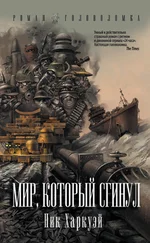‘It’s not safe.’ He tried again. ‘You have to come with me.’ He made a beckoning gesture. Did she understand language, even though she could not speak? Did waving your hands count as language? Or was she so completely alien now that it didn’t matter, that anything he might attempt to tell her would just be sound and light? Operationally speaking, he realised, he should probably have asked more questions at the beginning.
‘There is a boy.’ He was pantomiming a small, slim person, her son, knowing that she would make nothing of it. ‘Your son, the one you don’t remember. He still loves you and I love him,’ and that was his first time saying that aloud. ‘I came to rescue you. To bring you to him.’ He thought he saw a glimmer of understanding in her face, of happiness or assent, but then she shrugged and wandered away to look at the damage they had done.
He could not leave her here. She was vulnerable to the burning town and to the mob. She was an infant. He realised, in passing, that he had been wrong about something fundamental: no one looked after the boy. When he went away, it was not to be cared for but to care. His mother was his unwitting ward. All seeming evidence to the contrary was proof rather of his self-sufficiency. The comic books he provided for himself; the laptop, the phone, the food – for both of them, no doubt. He was in many ways already grown, waiting only for his body to catch up with his life.
The Sergeant felt a twinge of fellow feeling, unexpected. He had up to a point taken care of his father, when Arthur Ferris had withdrawn to his television set and his late-onset diabetes and smoked himself fiercely towards the plot beside his wife. Young Lester had forged school notes and worked odd jobs and thought he was looking out for number one, but somehow he had put food on the table for his dad as well, and seen him through the few remaining years. His sister, too, of course, but she had been older and already on her way. She had never entirely understood how much their father had ground to a halt, because he freshened up for her, at his son’s insistence, and they were complicit, if in no other way, in concealing the decay. But it had been nothing like this, not really. Or, only somewhat.
His vision flashed white and he was lifted from his feet, a solid impact taking him in the right kidney and hurling him forward. A knife blade, he realised, deflected by the links of chain woven into the vest, the power of it still passed to his body, if spread wide enough to avoid penetration. I’ll piss pink all week, he thought sourly, and rolled as fast as he could to avoid a stamping boot. If I get the chance.
He kept rolling and surged to his feet, bounced off a wall and swirled the torch around the room. There were two of them, ordinary thugs with ugly expressions. Their attention was on him but their goal was Sandrine. He looked for hunger and rape and, curiously, couldn’t see it. Just intent. The nearer one was flourishing the knife at him, the other had a short billy club. Take the blade, but don’t imagine the billy’s not a problem.
The Sergeant slowed, feigning disorientation, lashed out wildly when the man feinted, and invited a circular stab low at his left side, blocked it early and clipped the elbow with the torch to bend it, driving the weapon hand up along his enemy’s spine until the shoulder dislocated, then putting his knee upwards through the man’s face. Shadows danced and he kept moving, trusting in motion to keep him safe. The billy man rushed in belatedly – they weren’t used to working as a team, probably wouldn’t do it again – and the Sergeant threw his first target into the line of attack to ward him off. The knife skittered away and its owner collapsed, moaning.
The other man came on. The Sergeant remembered the taser but had no time to reach it as the man attacked, leading with his weak hand, the billy held in reserve for a quick finish. The Sergeant thrust the torch forward instead, directing the blinding light into the billy man’s face. The man scuttled back and reset his feet.
Sandrine drove the discarded knife in a straight line from the shoulder, hips twisting, power coming out of the legs and the strength of her entire body. The blade went through the back of the billy man’s skull and continued until the point made a soft sound against his forehead. She continued the spiral to bring the arm back, heel of the hand leading and the blade outward, then dropped the knife. He thought it was completely mysterious to her how she had come to be holding it in the first place. The corpse fell at the same time, like a sack.
She looked at the Sergeant, then dropped to her knees and drew the tiger from the stele on his chest, perfectly, in blood on the floor. She looked at him again as if to say that finished the matter, and walked out of the door. He was fairly sure she had no understanding of what had passed, that she had killed a man, and a worm of suspicion was gnawing in him that this was because she only barely grasped what it meant that he had ever been alive. The world – the island – was one piece to her. Some of it moved, and some of it did not, and that was all.
He stared after her, wondering how he would get her back to Brighton House, because force seemed a far less practicable option than it had five minutes before, and by the time he heard the engine outside and launched himself at the door he was too late.
Sandrine was in the back seat of an open white jeep, and beside her sat a woman the Sergeant did not recognise. The woman was actually singing, high and clear, and Sandrine, with blood still wet on her fingertips, was listening to her in placid fascination.
The driver saw the Sergeant and took off for the main road.
He ran flat out and kept the jeep in view, pale and angular and framed by the weird brown clouds at the edges of his vision. He sucked air, spat, and pushed his legs harder. The jeep meant Sandrine and Sandrine belonged to the boy and he had promised to get her. For as long as he could see it he could catch up, and that was the target, the plan. That was the order from authority, even if authority in this case was him.
He could keep up and even gain ground while they were in the shanty, because the narrow streets twisted and turned and the jeep was restricted to a few larger roads and even those were treacherous, especially now. He could run in a straight line and know roughly where they would have to turn and slow, where he might make up for time lost when their route was clear and the engine powered away from him, impossibly far ahead. For a few hundred yards he found himself running along the roofs of market stalls. He wasn’t sure how he’d got up there, vaguely recalled climbing some stairs to avoid a pile of rubble which had slouched sideways from a burned brick bakery into his path, remembered leaping insanely and making it, stumbling on and regaining his feet. Faces turned towards him, rioters and others peered up and wondered. He was drawing a crowd and that was bad, he was moonlit and that was bloody stupid, a good sniper would take about a second to pick him off. He should get down onto the street but then he might not be able to see the jeep when it turned at the T-junction ahead, might pick wrong and lose her. Then the stalls just stopped and he dropped off the last one, muscles white agony, and found that he had not fallen, was not flat on his back, but still moving. Behind him there were people shouting, pointing. Tigerman! Tigerman! He didn’t care. They had torches, both electrical and the old-fashioned kind, and they were following, watching. So long as they stayed back. So long as no one shot him, tripped him, ambushed him, the only important thing was ahead. This was running you could die of, the kind that had killed – the Sergeant, irrelevantly, had always been able to remember the man’s name since learning it at school, a piece of military trivia which hadn’t impressed the recruiter – Pheidippides of Athens after the original Marathon.
Читать дальше








![Ник Харкуэй - Гномон [litres]](/books/400023/nik-harkuej-gnomon-litres-thumb.webp)



